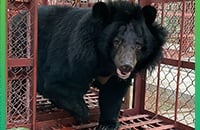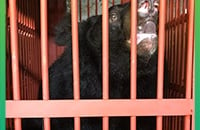Moon bears are world’s most exploited bear
06 January 2015
The moon bear is the world's most poached and smuggled bear – according to a new report from Interpol.
The report on the worldwide trade of bears and their parts estimates the trade is worth $2 billion.
While the document outlines the plight of eight species across four continents, it's Asia's moon bears – prized for their bile – which are the most sought after with products from wild bears in particular demand.
Wild bear bile can fetch up to 65 times more than that from a farmed bear.
The findings, which echo a 2014 report by Traffic, contradict bear farmer's claims that the legal breeding of bears for their bile reduces poaching of animals in the wild.
Read the full Interpol report, which was sponsored by Humane Society International, here.
Animals Asia founder and CEO, Jill Robinson MBE said:
"This is very much in line with what we have been saying – far from alleviating pressure on wild bear populations, the legal bear bile market in China has only intensified poaching by both fuelling demand and seeing wild bears taken illegally from the wild to supplement the number of bears on bile farms."
In their report, Interpol call on the world's governments to unite to save the world's bear populations.
Head of Interpol's Environmental Security unit, David Higgins, said:
"Improving enforcement coordination, from legislation to investigation, can have a considerable impact on syndicates involved in the trade."
"A unified planning process with cooperative multinational enforcement efforts bringing together police, customs and wildlife law enforcement units is crucial if we want to dismantle the complex networks of individuals."
The report follows 2014's release by Traffic which showed the illegal trade in bears has nearly tripled in Asia between 2000 and 2011.
Traffic found that while moon bears are the most heavily traded, sun bear populations have reportedly declined by 30 per cent over the past 30 years because of deforestation and trade.
Jill Robinson added:
"We commend Interpol's report into the trade of bears and their parts for highlighting just how widespread the trade has become. It is truly global and huge amounts of money are being made at the expense of the world's bear populations."
"Interpol's call for global action against the trade is something we strongly welcome. The issue requires a multinational response and as always we're ready and willing to work with all parties to find solutions."
BACK







 Freedom after two decades: Moon bears Nang and Mua rescued
Freedom after two decades: Moon bears Nang and Mua rescued
 With heavy hearts we say goodbye to our beloved Tulip
With heavy hearts we say goodbye to our beloved Tulip
 Three moon bears rescued from notorious bear bile farming hotspots in Vietnam
Three moon bears rescued from notorious bear bile farming hotspots in Vietnam
